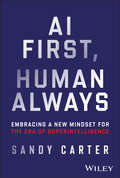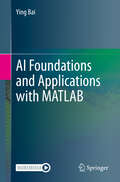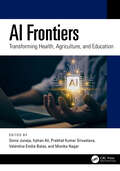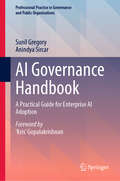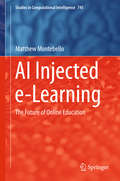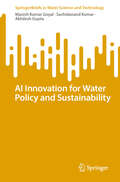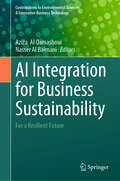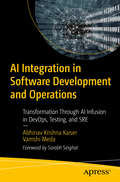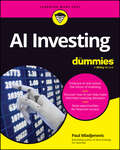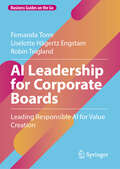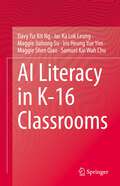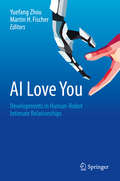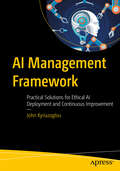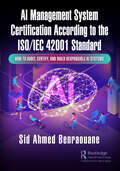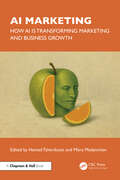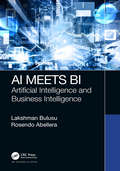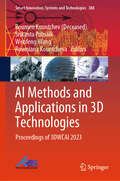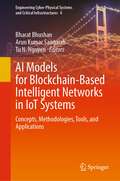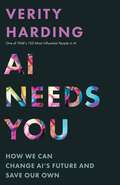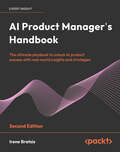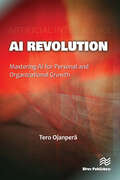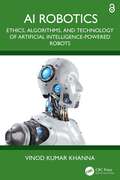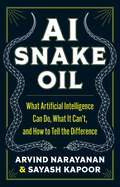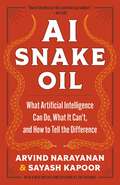- Table View
- List View
AI First, Human Always: Embracing a New Mindset for the Era of Superintelligence
by Sandy CarterLeadership wisdom to ride the wave of the seven hottest trends in our new AI-first world of business Written by seasoned tech executive Sandy Carter, AI First, Human Always: Embracing a New Mindset for the Era of Superintelligence is your guidebook to the seven hottest trends in AI. This book will recalibrate your approach to the exponential curve of emerging AI solutions for business. It will help you transform today's unstoppable currents of change into tailwinds that propel your organization to great heights. From the tokenization of everything, to multi-model learning models, to the importance of technical convergence and the implementation of digital twins across almost every industry imaginable, this book provides an essential core knowledge base as well as examples and case studies to help you transform your approach to leadership to meet the demands of the modern business era. Throughout the book, Carter drives home the essential coexistence of technology, emotion, intelligence, creativity, intuition, and ethics to enhance, rather than replace, the human experience. Some of the topics that Carter explores include: How to foster an AI-driven culture with experimentation Strategies for applying first principles before starting an AI project Ways to balance human and AI collaboration AI First, Human Always: Embracing a New Mindset for the Era of Superintelligence is a timely, essential read for all business leaders and professionals aiming to prepare for AI's broader implications on society and the economy. Grab your copy today and stay one step ahead of the competition in a digital world evolving at breakneck speed.
AI Foundations and Applications with MATLAB
by Ying BaiThis textbook provides fundamentals and practical skills on AI foundations and applications with two MATLAB programming modes. It includes twelve chapters with detailed introductions for the foundation knowledge of AI, structures, key components, and hands-on AI projects implemented in various applications in our world. Unlike other AI related textbooks, in which the Python is used, the MATLAB is adopted in this textbook. The Python programming mode builds AI projects with functions involving huge blocks of codes, which is a difficult task. However, in MATLAB mode, provides two programming styles, Apps, and function library. The Apps graphical user interface (GUIs) assist users, especially the beginners, to learn and build AI projects with no coding lines quickly and easily. To compensate the possible code-hiding in Apps, MATLAB provides a Converting Codes function to allow users to convert those Apps to the related codes. It enables users to have a clear picture between Apps and detailed coding process. The function library enables users to build AI projects with detailed codes. This textbook also includes homework questions, exercises, lab projects and case studies. This book is designed as a textbook for advanced-level students in Computer Science or Computer Engineering. Also, AI engineers, who have an interest in learning and developing professional AI applications to solve real problems in the world will want to purchase this book.
AI Frontiers: Transforming Health, Agriculture, and Education
by Valentina Emilia Balas Prabhat Kumar Srivastava Sonia Juneja Irphan Ali Monika NagarThe rapid advancement of artificial intelligence (AI) is revolutionizing key sectors critical to global progress. AI Frontiers: Transforming Health, Agriculture, and Education delves into how cutting-edge AI innovations are addressing some of the world’s most pressing challenges. This comprehensive volume explores the transformative impact of AI across healthcare, agriculture, and industrial landscapes, offering insights into practical applications, emerging trends, and future opportunities. By blending theoretical foundations with real-world case studies, this book empowers readers with actionable knowledge to leverage AI effectively.What sets this book apart is its interdisciplinary approach, combining technical depth with sector-specific insights. It goes beyond the basics to highlight ethical considerations, data governance frameworks, and sustainable development initiatives. Each chapter presents a roadmap for integrating AI solutions to enhance productivity, efficiency, and decision-making in diverse industries.Key Features: In-depth exploration of AI’s role in healthcare, from predictive analytics in diagnostics to AI-driven drug discovery and personalized treatment strategies. Detailed insights into AI applications in agriculture, including precision farming, crop disease prediction, and resource optimization. Coverage of industrial innovations powered by AI, such as predictive maintenance, process automation, and quality control systems. Case studies illustrating successful AI implementations in real-world scenarios. Discussion of ethical AI deployment, data privacy challenges, and strategies to bridge the digital divide. Forward-looking perspectives on AI’s role in advancing the United Nations’ Sustainable Development Goals (SDGs). This book is an essential resource for researchers, industry professionals, policymakers, and students seeking to understand the transformative power of AI. Whether you are a tech enthusiast, academic, or decision-maker, AI Frontiers offers valuable insights to help you navigate the rapidly evolving landscape of AI-driven innovation.
AI Governance Handbook: A Practical Guide for Enterprise AI Adoption (Professional Practice in Governance and Public Organizations)
by Sunil Gregory Anindya SircarEnterprise AI represents a transformative moment in technology, empowering businesses to unlock the potential of data, automation, and advanced analytics. It drives innovation, streamlines operations, and amplifies competitiveness in an increasingly digital economy. Yet, as promising as this technology is, adopting Enterprise AI is no simple feat. It demands a strategic alignment of AI initiatives with organizational goals while addressing many complex risks and challenges. Businesses face a new frontier of operational dilemmas, from algorithmic bias and data privacy concerns to the legal and ethical quandaries of AI-generated content. Questions of accountability for AI actions, intellectual property rights, and the threat of data laundering or AI hallucinations further complicate the landscape. Amid these challenges, enterprises are tasked with navigating a "pre-regulatory era," where global authorities are racing to establish policies and frameworks for a trustworthy and lawful AI ecosystem. The AI Governance Handbook is a comprehensive guide tailored for stakeholders at the forefront of AI adoption—executives, managers, data scientists, engineers, and compliance professionals. This essential resource provides the knowledge, tools, and strategies to lead organizations through the complexities of implementing AI responsibly and effectively. Packed with actionable insights, the handbook explores critical topics such as aligning AI strategies with organizational objectives, managing ethical dilemmas, adhering to emerging regulations, and fostering transparency in AI operations. It offers readers a roadmap to build a resilient and dependable AI framework prioritizing fairness, accountability, and innovation.
AI Injected e-Learning: The Future of Online Education (Studies in Computational Intelligence #745)
by Matthew MontebelloThis book reviews a blend of artificial intelligence (AI) approaches that can take e-learning to the next level by adding value through customization. It investigates three methods: crowdsourcing via social networks; user profiling through machine learning techniques, and personal learning portfolios using learning analytics. Technology and education have drawn closer together over the years as they complement each other within the domain of e-learning, and different generations of online education reflect the evolution of new technologies as researcher and developers continuously seek to optimize the electronic medium to enhance the effectiveness of e-learning. Artificial intelligence (AI) for e-learning promises personalized online education through a combination of different intelligent techniques that are grounded in established learning theories while at the same time addressing a number of common e-learning issues. This book is intended for education technologists and e-learning researchers as well as for a general readership interested in the evolution of online education based on techniques like machine learning, crowdsourcing, and learner profiling that can be merged to characterize the future of personalized e-learning.
AI Innovation for Water Policy and Sustainability (SpringerBriefs in Water Science and Technology)
by Manish Kumar Goyal Akhilesh Gupta Sachidanand KumarIn the face of unprecedented challenges in managing water resources, the integration of artificial intelligence (AI) emerges as a revolutionary force, reshaping the landscape of water conservation, treatment, irrigation, policy formulation, watershed management, and the monitoring of groundwater and surface water. This book explores the transformative role of AI in the water domain, exploring cutting-edge applications and innovative solutions that promise to address pressing issues in sustainable water management. As we navigate the complexities of a changing climate, population growth, and urbanization, the chapters within this book offer insights into how AI technologies can enhance efficiency, optimize resource utilization, and provide data-driven strategies for ensuring the resilience and sustainability of our vital water ecosystems. From intelligent water treatment systems to precision agriculture and policy decision support, each chapter unfolds a narrative of AI-driven advancements, providing a comprehensive guide for researchers, practitioners, and policymakers navigating the intersection of artificial intelligence and water management.
AI Integration for Business Sustainability: For a Resilient Future (Contributions to Environmental Sciences & Innovative Business Technology)
by Aziza Al Qamashoui Nasser Al BaimaniThis book offers a comprehensive exploration of artificial intelligence (AI) integration for business sustainability for a resilient future. Delving into the dynamic interplay between AI and sustainable business practices, it serves as a vital guide for professionals, entrepreneurs, policymakers, and researchers seeking to embrace innovative solutions to drive sustainability initiatives forward. From its inception, the book sets out to showcase the critical role that AI plays in reshaping modern business landscapes towards sustainability. It extensively covers various facets with foundational understanding of sustainability and AI evolution and detailed insights into successful AI integration in industries such as agriculture, education, energy, manufacturing, and healthcare. Through real-world case studies and practical strategies, it illuminates how AI can optimize operations, mitigate environmental impact, and foster social responsibility. The book addresses the core challenges faced by businesses in implementing AI-driven sustainability solutions. It navigates through adoption barriers, regulatory concerns, and ethical considerations, offering actionable advice for responsible AI integration. Furthermore, it presents future trends and emerging technologies, empowering readers to anticipate disruptions and utilize innovative AI solutions.
AI Integration in Software Development and Operations: Transformation Through AI Infusion in DevOps, Testing, and SRE
by Abhinav Krishna Vamshidhar MedaDiscover how Artificial Intelligence (AI) is transforming the fields of software development, testing, and IT operations by enhancing efficiency, reducing human error, and accelerating processes. This book showcases the practical applications of AI-driven tools, such as automating coding, testing, and operational tasks, predicting potential issues, and optimizing performance. Aimed at digital leaders, practitioners, and customers, this book provides strategic insights and actionable guidance on how to integrate AI technologies to boost productivity, enhance product quality, and streamline development cycles. It serves as a comprehensive guide for those looking to leverage AI to drive innovation, cut costs, and stay competitive in an ever-evolving technological landscape. You’ll explore how AI can be integrated into software development, testing, and IT operations to improve efficiency, accuracy, and speed. Through real-world use cases, you’ll see how AI-driven tools can automate tasks, reduce human error, and improve processes across the development lifecycle. AI Integration in Software Development and Operations offers actionable insights on using AI to accelerate innovation, enhance product quality, and optimize costs in your modern software and IT environments. What You Will Learn Review the SDLC lifecycle, DevOps, SRE and accompanying topics Understand machine learning basics, AI techniques, and data preprocessing for DevOps Explore how AI integration into all phases of SDLC boosts productivity, increases effectiveness, and reduces human error Gain a familiarity with AI tools, their use cases, and the value in integrating them Who This Book is For Software engineers, developers, programmers, DevOps engineers, and AI practitioners who are interested in integrating AI into their DevOps practices.
AI Investing For Dummies
by Paul MladjenovicWinning strategies for investors looking to boost gains with artificial intelligence AI is one of the hottest investment trends on Wall Street. AI Investing For Dummies gives you all the must-know details on how artificial intelligence can benefit investors. You’ll learn how powerful AI can be in helping you make better decisions, identify hidden opportunities, and build wealth in stocks, bonds, commodities, and real estate. This easy-to-understand Dummies guide also covers budgeting, taxes, estates, and planning for college and retirement—all with AI-specific tactics that can improve efficiency, mitigate risk, and level up your portfolio’s performance. You’ll also find all the info you need to sift through and implement the right resources and solutions for you. Understand the benefits and drawbacks of AI investing Debunk the biggest myths about AI investing Get an in-depth analysis of the top AI stocks to watch Learn how to avoid common pitfalls in AI investing Take a peek at the role of AI in shaping the future of finance This is the ideal Dummies resource for consumers and investors who are new to AI and want to wrap their heads around this emerging technology.
AI Leadership for Corporate Boards: Leading Responsible AI for Value Creation (Business Guides on the Go)
by Robin Teigland Fernanda Torre Liselotte Hägertz EngstamBy 2030, AI is expected to contribute $15.7 trillion to the global economy. However, corporate boards are increasingly struggling to respond to this systemic change. As AI increasingly influences business strategies and operations, board members and executives must ensure that their organization is using AI responsibly and effectively to maximize value and mitigate risks. Building on research conducted on some of the leading Nordic multinational companies, this book presents the Boards 4AI Leadership Matrix, a practical framework designed to guide and oversee AI capabilities at the board level. A special focus is placed on AI's complexities, ethical best practices, and sustainable growth. By equipping leaders with the necessary tools and knowledge, this book gives board directors the tools to make informed decisions that align with corporate governance standards and societal expectations.
AI Literacy in K-16 Classrooms
by Samuel Kai Chu Davy Tsz Ng Jac Ka Leung Maggie Jiahong Su Iris Heung Yim Maggie Shen QiaoArtificial Intelligence is at the top of the agenda for education leaders, scientists, technologists and policy makers in educating the next generation across the globe. Beyond applying AI in daily life applications and educational tools, understanding how to learn and teach AI is increasingly important. Despite these emerging technology breakthroughs, AI learning is still new to educators especially to K-16 teachers. There is a lack of evidence-based studies that inform them about AI learning, including design principles for building a set of curriculum content, and pedagogical approaches as well as technological tools. Teaching AI concepts and techniques from programming languages and developmentally appropriate learning tools (e.g., robotics, serious games, software, intelligent agents) across different education levels emerged in recent years. The primary purpose of this book is to respond to the need to conceptualize the emerging term “AI literacy” and investigate how to teach and learn AI in K-16 education settings.This book examines different aspects of learning artefacts, pedagogies, content knowledge and assessment methods of AI literacy education, from theoretical discussions to practical recommendations for curriculum and instructional design. An exhaustive summary of current evidence with examples is illustrated in this book, as well as cutting-edge research that serves as an AI literacy model for different countries’ contexts. Part I, “Conceptualizing AI literacy”, provides a detailed discussion on the development of the concepts and frameworks on AI literacy education, discusses the differences and similarities between AI in education (AIED) and AI literacy education, and illustrates the reasons why K-16 students need to learn AI. These concepts are brought together in Part II, “K-16 AI literacy education” to further summarize the pedagogies, learning content, learning tools and assessment methods to inform K-16 educators how to design their AI instruction at each education level. After that, part III “AI literacy for instructional designers” explores how instructional designers (i.e., AI developers and teachers) prepare themselves to become ready to design developmentally appropriate tools, platforms, services and curricula to empower students with AI literacy skills.
AI Love You: Developments in Human-Robot Intimate Relationships
by Martin H. Fischer Yuefang ZhouUsing an interdisciplinary approach, this book explores the emerging topics and rapid technological developments of robotics and artificial intelligence through the lens of the evolving role of sex robots, and how they should best be designed to serve human needs. An international panel of authors provides the most up-to-date, evidence-based empirical research on the potential sexual applications of artificial intelligence. Early chapters discuss the objections to sexual activity with robots while also providing a counterargument to each objection. Subsequent chapters present the implications of robot sex as well as the security and data privacy issues associated with sexual interactions with artificial intelligence. The book concludes with a chapter highlighting the importance of a scientific, multidisciplinary approach to the study of human - robot sexuality. Topics featured in this book include: The Sexual Interaction Illusion Model. The personal companion system, Harmony, designed by Realbotix™. An exposition of the challenges of personal data control and protection when dealing with artificial intelligence. The current and future technological possibilities of projecting three-dimensional holograms. Expert discussion notes from an international workshop on the topic. AI Love You will be of interest to academic researchers in psychology, robotics, ethics, medical science, sociology, gender studies as well as clinicians, policy makers, and the business sector.
AI Management Framework: Practical Solutions for Ethical AI Deployment and Continuous Improvement
by John KyriazoglouIn today’s rapidly evolving technological landscape, managing artificial intelligence effectively is crucial for both private-sector companies and public-sector organizations. This book provides a robust and ethical framework to guide you through the complexities of AI deployment and management. This book is your ultimate guide to preparing your organization for AI, developing and operating AI systems, and continuously assessing and improving your AI ecosystem. It introduces a well-tested, practical management system that emphasizes ethical principles and practical solutions. Designed with practicality in mind, this book offers ready-to-use examples and customizable approaches to fit your organization’s unique needs. Whether you are looking to enhance decision-making, improve customer support, or ensure ethical AI practices, this book provides the tools and insights needed to develop, operate, and assess AI systems effectively, regardless of compliance with the ISO AI standard. What You Will Learn: A philosophical framework to ground your AI initiatives. Guidance on navigating AI laws and regulations. A five-phase AI implementation approach covering preparation, management, development, operation, and assessment. Over 31 support tools, including policies, procedures, and ready-made examples of AI plans. Who This Book Is for: The audience of this book includes CIOs, IT Managers and AI Project Managers, IT development staff, AI and data science professionals, cybersecurity professionals, auditors (IT, Internal, External, etc.), CISOs and corporate security managers, HR managers and staff, compliance and data protection officers, and anyone else interested in using or operating AI systems.
AI Management System Certification According to the ISO/IEC 42001 Standard: How to Audit, Certify, and Build Responsible AI Systems
by Sid Ahmed BenraouaneThe book guides the reader through the auditing and compliance process of the newly released ISO Artificial Intelligence standard. It provides tools and best practices on how to put together an AI management system that is certifiable and sheds light on ethical and legal challenges business leaders struggle with to make their AI system comply with existing laws and regulations, and the ethical framework of the organization.The book is unique because it provides implementation guidance on the new certification and conformity assessment process required by the new ISO Standard on Artificial Intelligence (ISO 42001:2023 Artificial Intelligence Management System) published by ISO in August 2023. This is the first book that addresses this issue.As a member of the US/ISO team who participated in the drafting of this standard during the last 3 years, the author has direct knowledge and insights that are critical to the implementation of the standard. He explains the context of how to interpret ISO clauses, gives examples and guidelines, and provides best practices that help compliance managers and senior leadership understand how to put together the AI compliance system to certify their AI system. The reader will find in the book a complete guide to the certification process of AI systems and the conformity assessment required by the standard. It also provides guidance on how to read the new EU AI Act and some of the U.S. legislations, such as NYC Local Law 144, enacted in July 2023.This is the first book that helps the reader create an internal auditing program that enhances the company’s AI compliance framework. Generative AI has taken the world by storm, and currently, there is no international standard that provides guidance on how to put together a management system that helps business leaders address issues of AI governance, AI structure, AI risk, AI audit, and AI impact analysis. ISO/IEC 42001:2023 is the first international mandatory and certifiable standard that provides a comprehensive and well-integrated framework for the issue of AI governance. This book provides a step-by-step process on how to implement the standard so the AI system can pass the ISO accreditation process.
AI Marketing: How AI is Transforming Marketing and Business Growth
by Hamed Taherdoost Mitra MadanchianThis book explores the dynamic intersection of artificial intelligence (AI) technologies and marketing practices, offering a comprehensive guide to how AI is reshaping the way businesses connect with customers, optimize strategies, and drive sustainable growth. It presents an in-depth analysis of the latest AI applications in marketing, from personalized customer experiences to data-driven decision-making, predictive analytics, and intelligent automation.Drawing on real-world examples and the latest research, the book examines key innovations such as AI-enhanced personalization, AI-driven content creation, campaign optimization, and the strategic use of predictive analytics. It highlights practical strategies for selecting and integrating AI tools effectively, addresses the ethical challenges surrounding AI use in marketing, and discusses future trends that will shape business success in the digital era.AI Marketing is written for marketing professionals, business leaders, entrepreneurs, and students who want to stay ahead in a rapidly evolving field. It serves as an essential resource for anyone seeking to understand not just the potential of AI in marketing, but how to strategically apply it to achieve measurable results and long-term business growth.
AI Meets BI: Artificial Intelligence and Business Intelligence
by Lakshman Bulusu Rosendo AbelleraWith the emergence of Artificial Intelligence (AI) in the business world, a new era of Business Intelligence (BI) has been ushered in to create real-world business solutions using analytics. BI developers and practitioners now have tools and technologies to create systems and solutions to guide effective decision making. Decisions can be made on the basis of more reliable and accurate information and intelligence, which can lead to valuable, actionable insights for business. Previously, BI professionals were stymied by bad or incomplete data, poorly architected solutions, or even just outright incapable systems or resources. With the advent of AI, BI has new possibilities for effectiveness. This is a long-awaited phase for practitioners and developers and, moreover, for executives and leaders relying on knowledgeable and intelligent decision making for their organizations. Beginning with an outline of the traditional methods for implementing BI in the enterprise and how BI has evolved into using self-service analytics, data discovery, and most recently AI, AI Meets BI first lays out the three typical architectures of the first, second, and third generations of BI. It then takes an in-depth look at various types of analytics and highlights how each of these can be implemented using AI-enabled algorithms and deep learning models. The crux of the book is four industry use cases. They describe how an enterprise can access, assess, and perform analytics on data by way of discovering data, defining key metrics that enable the same, defining governance rules, and activating metadata for AI/ML recommendations. Explaining the implementation specifics of each of these four use cases by way of using various AI-enabled machine learning and deep learning algorithms, this book provides complete code for each of the implementations, along with the output of the code, supplemented by visuals that aid in BI-enabled decision making. Concluding with a brief discussion of the cognitive computing aspects of AI, the book looks at future trends, including augmented analytics, automated and autonomous BI, and security and governance of AI-powered BI.
AI Methods and Applications in 3D Technologies: Proceedings of 3DWCAI 2023 (Smart Innovation, Systems and Technologies #388)
by Srikanta Patnaik Roumen Kountchev Wenfeng Wang Roumiana KountchevaThis book features a collection of high-quality, peer-reviewed research papers presented at Second 'World Conference on Intelligent and 3D Technologies' (WCI3DT 2023), held in China during 26–28 May 2023. The book provides an opportunity to researchers and academia as well as practitioners from industry to publish their ideas and recent research development work on all aspects of 3D imaging technologies and artificial intelligence, their applications, and other related areas. The book presents ideas and the works of scientists, engineers, educators, and students from all over the world from institutions and industries.
AI Models for Blockchain-Based Intelligent Networks in IoT Systems: Concepts, Methodologies, Tools, and Applications (Engineering Cyber-Physical Systems and Critical Infrastructures #6)
by Bharat Bhushan Arun Kumar Sangaiah Tu N. NguyenThe goal of this book is to explore various security paradigms such as Machine Learning, Big data, Cyber Physical Systems, and Blockchain to address both intelligence and reconfigurability in various IoT devices. The book further aims to address and analyze the state of the art of blockchain-based intelligent networks in IoT systems and related technologies including healthcare sector. AI can ease, optimize, and automate the blockchain-based decision-making process for better governance and higher performance in IoT systems. Considering the incredible progress made by AI models, a blockchain system powered by intelligent AI algorithms can detect the existence of any kind of attack and automatically invoke the required defense mechanisms. In case of unavoidable damage, AI models can help to isolate the compromised component from the blockchain platform and safeguard the overall system from crashing. Furthermore, AI models can also contribute toward the robustness and scalability of blockchain-based intelligent IoT networks. The book is designed to be the first-choice reference at university libraries, academic institutions, research and development centers, information technology centers, and any institutions interested in integration of AI and IoT. The intended audience of this book include UG/PG students, Ph.D. scholars of this fields, industry technologists, young entrepreneurs, professionals, network designers, data scientists, technology specialists, practitioners, and people who are interested in exploring the role of AI and blockchain technology in IoT systems.
AI Needs You: How We Can Change AI's Future and Save Our Own
by Verity HardingA humanist manifesto for the age of AIArtificial intelligence may be the most transformative technology of our time. As AI&’s power grows, so does the need to figure out what—and who—this technology is really for. AI Needs You argues that it is critical for society to take the lead in answering this urgent question and ensuring that AI fulfills its promise.Verity Harding draws inspiring lessons from the histories of three twentieth-century tech revolutions—the space race, in vitro fertilization, and the internet—to empower each of us to join the conversation about AI and its possible futures. Sharing her perspective as a leading insider in technology and politics, she rejects the dominant narrative, which often likens AI&’s advent to that of the atomic bomb. History points the way to an achievable future in which democratically determined values guide AI to be peaceful in its intent; to embrace limitations; to serve purpose, not profit; and to be firmly rooted in societal trust.AI Needs You gives us hope that we, the people, can imbue AI with a deep intentionality that reflects our best values, ideals, and interests, and that serves the public good. AI will permeate our lives in unforeseeable ways, but it is clear that the shape of AI&’s future—and of our own—cannot be left only to those building it. It is up to us to guide this technology away from our worst fears and toward a future that we can trust and believe in.
AI Needs You: How We Can Change AI's Future and Save Our Own
by Verity HardingA humanist manifesto for the age of AIArtificial intelligence may be the most transformative technology of our time. As AI&’s power grows, so does the need to figure out what—and who—this technology is really for. AI Needs You argues that it is critical for society to take the lead in answering this urgent question and ensuring that AI fulfills its promise.Verity Harding draws inspiring lessons from the histories of three twentieth-century tech revolutions—the space race, in vitro fertilization, and the internet—to empower each of us to join the conversation about AI and its possible futures. Sharing her perspective as a leading insider in technology and politics, she rejects the dominant narrative, which often likens AI&’s advent to that of the atomic bomb. History points the way to an achievable future in which democratically determined values guide AI to be peaceful in its intent; to embrace limitations; to serve purpose, not profit; and to be firmly rooted in societal trust.Now with a new foreword by the author, AI Needs You gives us hope that we, the people, can imbue AI with a deep intentionality that reflects our best values, ideals, and interests, and that serves the public good. AI will permeate our lives in unforeseeable ways, but it is clear that the shape of AI&’s future—and of our own—cannot be left only to those building it. It is up to us to guide this technology away from our worst fears and toward a future that we can trust and believe in.
AI Product Manager's Handbook: The ultimate playbook to unlock AI product success with real-world insights and strategies
by Irene BratsisBlending strategic frameworks, real-world case studies, and cutting-edge AI insights, this guide equips product managers with the tools to navigate challenges, drive innovation, and build scalable, high-impact AI products.Key FeaturesGain insights into AI product discovery, market fit, and execution through structured frameworks.Learn to translate complex AI capabilities into real-world solutions that drive value.Understand ethical AI, bias mitigation, and compliance to build responsible AI products.Purchase of the print or Kindle book includes a free PDF eBook.Book DescriptionAI is rapidly transforming product management, presenting new challenges and business opportunities. As AI-driven solutions become more complex, product managers must bridge the gap between technological capabilities and business needs. This book provides a detailed roadmap for successfully building and maintaining AI-driven products, serving as an indispensable companion on your journey to becoming an effective AI product manager. In this second edition, you'll find fresh insights into generative AI, and responsible AI practices with the most relevant tools for building AI-powered products. Authored by a leading AI product expert with years of hands-on experience in developing and managing AI solutions, this guide translates complex AI concepts into actionable strategies. Whether you're an aspiring AI PM or an experienced professional, this book offers a structured approach to defining AI product vision, leveraging data effectively, and aligning AI with business objectives. With new case studies and refined frameworks, this edition provides deeper insights into ethical AI, cross-functional collaboration, and deployment challenges. By the end of this book, you’ll be equipped with the knowledge to drive AI product success with key techniques for identifying AI opportunities and managing risks in a rapidly evolving landscape.What you will learnPlan your AI PM roadmap and navigate your career with clarity and confidenceGain a foundational understanding of AI/ML capabilitiesAlign your product strategy, nurture your team, and navigate the ongoing challenges of cost, tech, compliance, and risk managementIdentify pitfalls and green flags for optimal commercializationSeparate hype from reality and identify quick wins for AI enablement and GenAIUnderstand how to develop and manage both native and evolving AI productsBenchmark product success from a holistic perspectiveWho this book is forThis book is tailored for aspiring and experienced product managers, AI strategists, and business leaders aiming to integrate AI into their products. A foundational understanding of AI is expected and reinforced throughout the book. It is particularly valuable for professionals looking to bridge AI and business strategy, optimize AI/ML applications, and drive data-informed decision-making. Engineers, designers, and executives seeking to align AI capabilities with user needs and market demands will also benefit from the insights and real-world case studies on building scalable AI products.
AI Revolution: Mastering AI for Personal and Organizational Growth
by Tero Ojanperä""The AI Revolution"" is a practical guide to using new AI tools, such as ChatGPT, DALLE and Midjourney. Learn how to multiply your productivity by guiding or prompting AI in various ways. The book also introduces Microsoft Copilot, Google Bard, and Adobe Photoshop Generative Fill, among other new applications.ChatGPT reached a hundred million users in just two months after its release, faster than any other application before. This marked the advent of the generative AI era. Generative AI models generate text, images, music, videos, and even 3D models in ways previously thought impossible for machines. The book explains in an understandable manner how these AI models work.The book provides examples of how AI increases productivity, which professions are changing or disappearing, and how job markets will evolve in the coming years. With this book, you'll learn to recognize the opportunities and risks AI offers. Understand what this change demands from individuals and companies and what strategic skills are required. The book also covers legal questions caused by generative AI, like copyrights, data protection, and AI regulation. It also ponders societal impacts. AI produces content, thus influencing language, culture, and even worldviews. Therefore, it's crucial to understand by whom and how AI is trained. The AI revolution started by ChatGPT is just the beginning. This handbook is for you if you want to keep up with the rapid development of AI.
AI Robotics: Ethics, Algorithms, and Technology of Artificial Intelligence-Powered Robots
by Vinod Kumar KhannaArtificial intelligence (AI) robots can learn from their experiences, make decisions in real time, understand natural language and human gestures, and utilize computer vision to perceive and comprehend their environments. Beginning with the rudimentary concepts of AI, AI Robotics: Ethics, Algorithms, and Technology of Artificial Intelligence-Powered Robots explores the intersection of robotics and physics and emphasizes the need for strict adherence to ethical principles in relation to overall progress and the development of humankind. Chapters on robots capable of talking, listening, and visual perception similar to human beings are followed by discussions of those that display emotional intelligence. This book also discusses task and motion planning, a set of methods that help robot hardware achieve high-level goals by breaking down tasks into smaller, more manageable steps. Lastly, the text describes autonomous robots that can make independent decisions and execute tasks on their own, utilizing sensors and AI-enabled software programmed with predefined guidelines and data. Examples of autonomous robots are presented in a chapter on robot swarms that operate in a decentralized, self-organizing manner through local communication to manage disaster relief, search-and-rescue operations, warehouse logistics, agricultural practices, and environmental exploration. Offering an up-to-date, expansive, and comprehensive treatment of the vast interdisciplinary field of AI robotics, this book will be an invaluable resource for postgraduate and doctorate students as well as academic researchers and professional engineers working on AI-enabled robotics.The electronic version of this book was funded to publish Open Access through Taylor & Francis’ Pledge to Open, a collaborative funding open access books initiative. The full list of pledging institutions can be found on the Taylor & Francis Pledge to Open webpage.Key Features Explores the research frontiers and advancements leveraged by integrating AI with robotics Highlights the unique challenges faced in robot vision and speech recognition vis-à-vis computer vision and standard speech processing Provides a state-of-the-art overview of emotional recognition, task and motion planning, and coordinated functioning of robots in multi-robot systems
AI Snake Oil: What Artificial Intelligence Can Do, What It Can’t, and How to Tell the Difference
by Arvind Narayanan Sayash KapoorFrom two of TIME&’s 100 Most Influential People in AI, what you need to know about AI—and how to defend yourself against bogus AI claims and productsConfused about AI and worried about what it means for your future and the future of the world? You&’re not alone. AI is everywhere—and few things are surrounded by so much hype, misinformation, and misunderstanding. In AI Snake Oil, computer scientists Arvind Narayanan and Sayash Kapoor cut through the confusion to give you an essential understanding of how AI works and why it often doesn&’t, where it might be useful or harmful, and when you should suspect that companies are using AI hype to sell AI snake oil—products that don&’t work, and probably never will.While acknowledging the potential of some AI, such as ChatGPT, AI Snake Oil uncovers rampant misleading claims about the capabilities of AI and describes the serious harms AI is already causing in how it&’s being built, marketed, and used in areas such as education, medicine, hiring, banking, insurance, and criminal justice. The book explains the crucial differences between types of AI, why organizations are falling for AI snake oil, why AI can&’t fix social media, why AI isn&’t an existential risk, and why we should be far more worried about what people will do with AI than about anything AI will do on its own. The book also warns of the dangers of a world where AI continues to be controlled by largely unaccountable big tech companies.By revealing AI&’s limits and real risks, AI Snake Oil will help you make better decisions about whether and how to use AI at work and home.
AI Snake Oil: What Artificial Intelligence Can Do, What It Can’t, and How to Tell the Difference
by Arvind Narayanan Sayash KapoorFrom two of TIME&’s 100 Most Influential People in AI, what you need to know about AI—and how to defend yourself against bogus AI claims and productsConfused about AI and worried about what it means for your future and the future of the world? You&’re not alone. AI is everywhere—and few things are surrounded by so much hype, misinformation, and misunderstanding. In AI Snake Oil, computer scientists Arvind Narayanan and Sayash Kapoor cut through the confusion to give you an essential understanding of how AI works and why it often doesn&’t, where it might be useful or harmful, and when you should suspect that companies are using AI hype to sell AI snake oil—products that don&’t work, and probably never will.While acknowledging the potential of some AI, such as ChatGPT, AI Snake Oil uncovers rampant misleading claims about the capabilities of AI and describes the serious harms AI is already causing in how it&’s being built, marketed, and used in areas such as education, medicine, hiring, banking, insurance, and criminal justice. The book explains the crucial differences between types of AI, why organizations are falling for AI snake oil, why AI can&’t fix social media, why AI isn&’t an existential risk, and why we should be far more worried about what people will do with AI than about anything AI will do on its own. The book also warns of the dangers of a world where AI continues to be controlled by largely unaccountable big tech companies.By revealing AI&’s limits and real risks, AI Snake Oil will help you make better decisions about whether and how to use AI at work and home.
